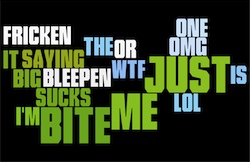Accents, real speech, figures of speech, colorful speech. Expressions. The way we use language fascinates me. I wonder if technology changes it?
I have questions:
- Why is groovy so hideously and embarrassingly obsolete, but cool is still cool? Am I the only one who still likes Paul Simon’s song, Feelin’ Groovy?

- Why does just sayin work so well, especially in Twitter, to smooth out rough edges, frame thoughts, and soften things? It’s almost like a Photoshop effect to make a photograph look like a painting. I don’t get it. I mean, I’m just sayin.
- And why does is it just me seem to flow so well, almost like just sayin, as a statement softener?
- How do you pronounce LOL? Can you use it outside of instant messaging and/or Twitter? Is it okay in normal conversation? And what about WTF and OMG, both acronyms using single-syllable letters instead of single-syllable words. I think I know the answer to that one. Not that there is a single right answer. BTW, I liked it when my daughter was studying in Madrid, and came up with QTF. Although I hate the F part of that.
And also, some simple observations, about language in my lifetime, and how it’s been changing.
- I love the way Spanish has grown and prospered inside our modern American English. Starting with simple expressions like nada and the whole enchilada, there’s Spanish all over the place now, and I, for one, love it. I think it’s a living example of the kind of natural change that brought French into English a few centuries ago, and that gave us, gradually, the English we speak instead of the English they spoke in Shakespeare’s time. I like to see that living change. And I like it that it’s happened before. Deja vu. And here’s a test of popular culture: can you say deja vu without adding the Yogi Berra addition, all over again? Nobody seems to use the naked deja vu expression anymore. It’s verboten.
- I hate the expression that something sucks, meaning that it’s bad. Do you know where that expression has been? And if you don’t, I warn you, don’t ask anybody who was a boy in the 1950s or 1960s. And then there are those related expressions, like bite me, or it bites the big one. Not good. It’s weird, to me, that these are now commonplace, and accepted by picky censors, like on network TV.
- And, speaking of what’s acceptable on network television these days, I kind of like what Jon Stuart and Stephen Colbert have done with the beeped-out expression. Have you noticed how well they both use that? This stuff can be overused, but still, language and expression prevails.
- And all the cleaned expressions, like bleeping and fricken, [Ed. Note: and the popular (among sci-fi fans) frak from the Battlestar Gallactica TV series].
- Is it possible that all of the silliness related to code works and acceptable and nonacceptable has contributed to the twisting and distortions?
- Which reminds me, the overuse of certain words becomes just silly. I listen to people on a bus unable to say a simple sentence without adding fuckin after every three words. What’s up with that? Doesn’t it get in the way? I think an actual conversation with all that extra burden would be exhausting. Do they even hear it?
- I suspect that the worst language anywhere in this country, in terms of supposedly swearing and foul words and such, is found on the elementary school playgrounds, particularly where the fourth-sixth grade boys are playing?
I’m just sayin.




Comments
I guess language does undergo a kind of cycle somehow, where some words that used to be “uncool” become popular choices in conversations, while others hibernate for some time before becoming active again as a “rad” invective.
One day, when you read this entry again, Tim, there may be other words that we perceive as “obsolete” now but in 5 to ten years, they’ll be so popular it becomes a “word-of-mouth” (get it?).